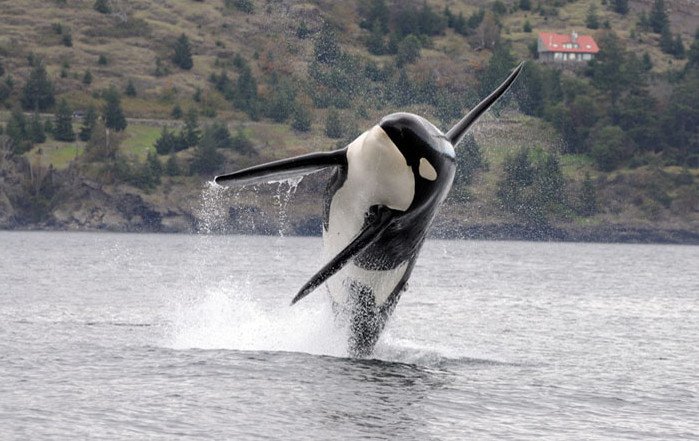Oregon Fish and Wildlife Commission lists Southern Resident orcas as endangered, adopts survival guidelines

HILLSBORO, Ore. (KTVZ) — The Oregon Fish and Wildlife Commission voted unanimously Friday to list Southern Resident orcas as endangered under Oregon’s Endangered Species Act.
Southern Resident orcas now number just 75 whales in three pods and have been listed as endangered under federal law since 2005.
Their reproductive potential is in danger of failure due to their small population size, inbreeding and other reproductive issues. Scarcity of prey (especially Chinook, their preferred prey), sound and vessel disturbance and exposure to high levels of contaminants are the primary reasons for their decline.
The Oregon coast is an important travel corridor for Southern Resident orcas in the K and L pods, with the area near the Columbia River mouth serving as a foraging hot spot. Oregon’s coastal waters (6-200 m depth) were federally designated as critical habitat in 2021.
The commission also adopted survival guidelines for Southern Resident orcas. These are required under OESA and apply to actions proposed on state lands or waters and help guide state agencies that play a role in conservation until the Commission approves a management plan for these agencies.
Guidelines adopted Friday direct relevant state agencies to further monitor and address pollutants, especially those posing the highest risk for Southern Resident orcas and their prey; increase boater education on the current federal vessel buffer guidelines to reduce vessel and noise disturbance; enhance hatchery Chinook salmon production if capacity and funding exists; and increase efforts to prevent oil and other hazardous material spills.
In other business, the Commission appointed Davia Palmeri as interim director of the Oregon Department of Fish and Wildlife. Palmeri will serve in the position starting April 1, (when current ODFW Director Curt Melcher retires) until a new permanent director starts at ODFW.
In her six years at ODFW, Palmeri has served as the Conservation Policy Coordinator and Tribal Policy Coordinator. Last year, she served in a six-month rotation as Acting Deputy Director for Fish and Wildlife Programs. She is currently serving as the Acting Land Resources Program Manager.
Palmeri is not applying for the permanent director position. (Commissioners indicated they would choose an interim director who was not a candidate for the position during their Jan. 26 meeting.)
Chair Wahl also discussed the timeline for selecting a permanent director, noting that the commission expects to select a new director at the May meeting. The public forum with final candidates is also expected to occur in May.
A recording of Friday’s meeting is available at https://www.youtube.com/watch?v=E26TMIilGDE
--
News release from the Center for Biological Diversity:
Southern Resident Orcas Receive Oregon Endangered Species Protections
PORTLAND, Ore.— The Oregon Fish and Wildlife Commission voted today to protect Southern Resident orcas under the state’s Endangered Species Act, responding to a February 2023 petition from the Center for Biological Diversity, Defenders of Wildlife, and Whale and Dolphin Conservation.
“I’m feeling more confident about the Southern Resident orcas’ recovery now that Oregon is joining this critical all-hands-on-deck effort,” said Brady Bradshaw, oceans campaigner at the Center for Biological Diversity. “These struggling whales need the entire Pacific Northwest to work together to bring back a healthy wild Chinook salmon population and strengthen the marine ecosystem. With Oregon at the table, the real work can begin.”
Today’s listing decision requires Oregon to develop an endangered species management plan, which will require state agencies to develop concrete actions that address the primary threats to orcas in Oregon. The petitioners also recommended improvements to the survival guidelines. One of those, aiming to strengthen protections against pollution, was added today by the commission.
Southern Resident orcas are listed as endangered under the federal Endangered Species Act as well as Washington state’s Endangered Species Act, but the population has continued to decline.
“The Oregon ESA listing is a meaningful step toward stronger Southern Resident orca recovery in the Pacific Northwest,” said Kathleen Callaghy, Defenders of Wildlife Northwest representative. “Now the real work begins. State agencies will be taking on an important responsibility and it's the public's job to both support and hold them accountable.”
Unlike other orcas, Southern Resident orcas feed almost exclusively on Chinook salmon, which are also experiencing population declines because of dams, habitat destruction, toxic pollution and other issues.
“Southern Resident orcas’ survival as a species depends on Oregon’s inland waterways and resources. At the same time, the residents of Oregon depend on the ecological role whales play in keeping the ocean healthy,” said Regina Asmutis-Silvia, executive director at Whale and Dolphin Conservation. “Ensuring this iconic species is protected in Oregon is truly a win-win.”
Orcas are recognized by their striking black and white coloration and their history in popular culture. Scientists have observed that Southern Resident orcas have their own dialects and culture, with distinctions between pods.
Although these orcas are known to live in the Puget Sound and coastal waters of Washington state, the Southern Residents also spend considerable time feeding in the inland and coastal waters of Oregon and California. The mouth of the Columbia River on Oregon’s northern border is a crucial foraging area for the whales. More than half the Chinook salmon the orcas consume while in coastal waters comes from the Columbia Basin.